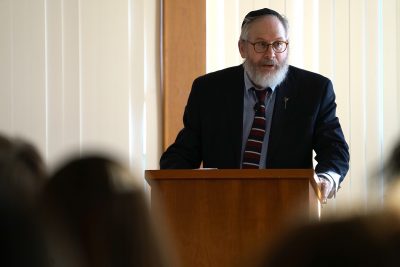
Nearly 50 Boston University students and professors gathered at the Florence and Chafetz Hillel House Thursday night for a symposium on the Nuremberg Doctors Trial’s impact.
The conference touched on topics relating to the trial, such as law, bioethics and human rights. It featured six speakers, including professors, a rabbi and a student.
Erin Miller, a research associate at BU’s Elie Wiesel Center for Jewish Studies, said the conference was intended to examine the trial’s global significance over time.
“Where we have been with regard to medical ethics and human rights is as important as where we are now,” Miller, a first-year graduate student and one of the speakers, said before the conference. “By partnering with university departments, centers and student groups, we are broadening our reach of who could attend and participate in the conference.”
The conference was formatted to give the audience opportunities to ask further questions, Miller said. She said the center selected speakers who would give perspectives from various fields.
“We wanted to gather scholars of diverse interests to discuss the historical implications of Nuremberg as well as the contemporary impact it has on science today,” Miller said.
Michael Grodin, a School of Public Health professor and one of the speakers, said some issues the speakers touched on from the Holocaust are still prevalent today.
“There are still issues of eugenics, of euthanasia, of state-sponsored involvement in medicine, and doctors involved with torture,” he said before the conference.
BU School of Medicine professor Sondra Crosby likened doctors’ complicity with torturing Jews during the Holocaust to tortures that are currently happening at Guantanamo Bay.
Another speaker, Holocaust survivor and Hillel Rabbi Emeritus Joseph Polak, described the scene when Allied troops walked into concentration camps.
“There was typhus, tuberculosis and lice strewn everywhere,” Polak said. “The dead, by the scores of thousands. Dressed and undressed. Near them, near scores of thousands of dead, were the living, and it was very hard to tell one from the other.”
Polak said the lasting devastation will never harmonize with reality.
“It is not possible for life to resume in any normal way once you witness that,” Pollak said. “Nothing computes. Nothing makes any sense … If the physicians can witness that [and continue to exploit the Jews] … nothing can make sense.”
Miller, in her speech, talked about the Nazi’s eugenics program and how the doctors, those who were trained to help people, provided necessary medical knowledge to help carry out Adolf Hitler’s plan.
“The Nazis needed the doctors, and the doctors needed the Nazis,” she said. “What began as a public health ‘problem’ [of racial hygiene] ultimately led to the genocide of the Jewish people.”
Students in attendance said the conference reiterated how important it is to reflect on calamitous historical events like the Holocaust.
Grace Ferri, a junior in the College of Arts and Sciences, said she found what the experts said to be informative and useful.
“There are so many BU faculty who are so invested in this,” Ferri said. “We have some of the most prominent and knowledgeable people in the United States about these issues here, and we should take advantage of that.”
Katherine Churchwell, a first-year graduate student in SPH, said Holocaust education is imperative in the long run.
“I thought it was interesting for sure,” Churchwell said. “I think it’s important to remember events like these. If we don’t acknowledge and talk about the Holocaust, then history has the potential to repeat itself.”
Rebecca Matta, a CAS senior, said she learned a lot about a variety of topics ranging from torture in military prisons to the role of medics during the Holocaust.
“I had no idea about Guantanamo,” Matta said. “I learned a lot about torture and the doctor’s role … I think it’s important to bring awareness to the Holocaust, and to never forget, even after 70 years.”























































































































